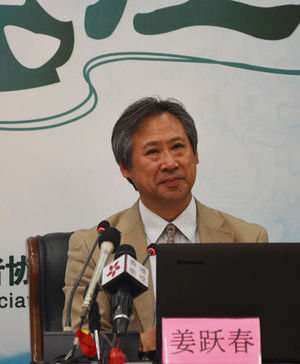Countries in the Asia-Pacific region lack a spirit of mutual trust and cooperation, and to change that China and Japan, as the two biggest powers, should take the responsibility to enhance regional development and promote economic integration, members of the media were told.
 |
|
Jiang Yuechun, director of the China Institute of International Studies' Department for World Economy and Development. |
Jiang Yuechun, director of the China Institute of International Studies' Department for World Economy and Development addressed the Chinese Reporters Association on "the opportunities and challenges of China-Japan economic and trade relations" on Tuesday.
The volume of trade between China and Japan enjoyed a continuous rise before 2012, and reached $344.9 billion in 2011. However, volume fell in 2012 and 2013 and total exports from China to Japan have been exceeded by the US, falling to second place in five years.
Jiang said problems affecting China-Japan economic relations are largely because of deteriorating political relations in recent years, and that is due to Japan's China policy and handling of historical problems.
A structural shift in strength between the two is a significant feature of China-Japan economic relations. China's rapid economic growth in the 21st century has made China the second largest economy in the world, with GDP exceeding that of Japan in 2010.
Compared with its own economic depression, China's economic growth has fanned the flames of the "China threat" theory in Japan and many think China's rise has made China the biggest competitor for Japan in East Asia.
Since the mid-1990s, Japanese investment in China has begun to shrink. Japan also established barriers to Chinese exports, especially on agricultural products and set double standards on products exported to China and products for domestic use.
Although China and Japan are experiencing a period of confrontation, China is still playing a prominent role in Japan's economy. Statistics show that Japanese exports to China in 2011 accounted for 19.7 percent of its total exports and Chinese exports to Japan accounted for 17.4 percent of Japan's total imports. What is more, 43.7 percent of tourists in Japan in 2011 are Chinese with a per capita consumption of 160,000 yen (about $1,554).
Since China and Japan complement each other in economic structure, developing economic and trade cooperation between China and Japan benefits both. China is rich in natural, labor and capital resources while Japan is distinguished in knowledge, information and technology. Complimenting each other creates many opportunities such as in the field of automobiles, agriculture and textiles.
Jiang suggested the two countries may consider the East Sea as a breakthrough. The territorial dispute is a factor of confrontation but can also be a point for cooperation, such as to guarantee the interdependence between the two through energy cooperation.
Even Japanese Prime Minister Shinzo Abe has stressed the importance of China-Japan economic relations. He said in April that China's economic growth is an opportunity for Japan and the world. China is the biggest trade partner of Japan and the two are economically inseparable.
As China has at least 24 years to reach a high urbanization rate of 70 percent, the process of China's urbanization provides huge room for economic development, potential no other developed country has. Jiang urged that Japan should realize that China is still in its youth in economic development and fully grab the opportunities it brings.
